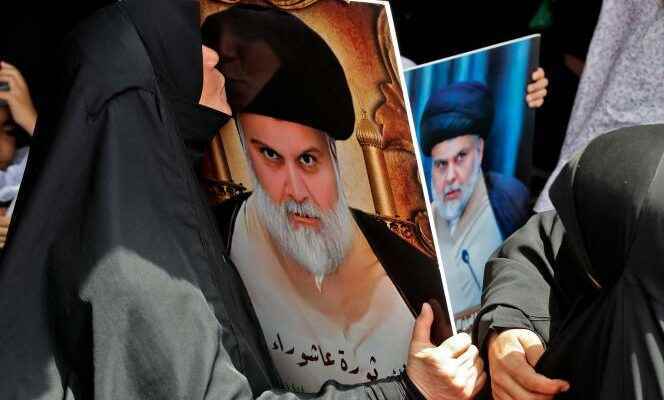The Iraqi army decreed, Monday, August 29, a curfew on the whole country from 7 p.m. (6 p.m. in Paris), after hundreds of supporters of Moqtada Sadr invaded the headquarters of the Council of Ministers in Baghdad in reaction to the “permanent withdrawal” of the policy of the Shiite leader.
Sympathizers of the religious and political leader “entered the Palace of the Republic”, located in the ultra-secure “green zone” whose access has been closed, said a security source on condition of anonymity. Live ammunition was heard there, according to journalists from Agence France-Presse (AFP) on the spot.
According to medical sources quoted by AFP, twelve supporters of the Shiite leader were killed and at least 270 others injured. Witnesses said those responsible for the shootings were supporters of the Coordination Framework, the Sadrists’ pro-Iran rival. In addition, the security forces fired tear gas canisters to disperse the sadrists at the entrances to the “green zone”, a security source said.
Other government buildings overrun
The Palace of the Republic is located in Baghdad’s iconic ‘Green Zone’. Built under Saddam Hussein, it was used by the former dictator to receive distinguished guests and now houses the Council of Ministers.
Prime Minister Mustafa Al-Kazimi suspended him ” until further notice “calling Moqtada Sadr to “order protesters to withdraw from government institutions”. The UN mission in Iraq, whose headquarters are in the “green zone”, for its part, called on the demonstrators to leave the area, urging all parties to “maximum restraint”. US Department of Defense spokesman John Kirby said the violence was “disturbing” and called to ” calm “ and at “dialogue”.
In the streets of Baghdad, several thousand Sadrists marched towards this downtown wall, chanting “Moqtada! Moqtada! », according to an AFP journalist. In the evening, chaos spread to other Iraqi regions: in the province of Zi Qar (south), several Sadrists invaded the seat of the governorate and entered other official buildings in Nassiriyah, according to AFP.
The seat of the governorate of Babylon (center), in the city of Hilla, was also occupied by supporters of Moqtada Sadr, witnesses said. Several roads linking Hilla to Baghdad and other southern provinces have also been cut. For fear of excesses, the Iraqi army had first decreed a “curfew in the capital”before extending it to the whole country.
“Definitive withdrawal” of Moqtada Al-Sadr from politics
In the morning, Mr. Al-Sadr announced his “permanent withdrawal” politics. “I had decided not to interfere in political affairs. I therefore now announce my final withdrawal and the closure of all institutions except the Sacred Mausoleum [de son père Mohammed Sadeq Al-Sadr mort en 1999]the Honor Museum and the Al-Sadr Heritage Authority”, he wrote on Twitter.
The very influential Shiite cleric, accustomed to blows, announced his withdrawal as Iraq has been mired in a deep political crisis since the legislative elections of October 2021. Rich in oil but overwhelmed by a serious economic and social crisis , the country still does not have a new prime minister or a new government, the Shiite forces, including that of Mr. Al-Sadr, failing to agree on their mode of appointment.
For weeks, Mr. Al-Sadr, who has tens of thousands of supporters among the population, has been calling for the dissolution of Parliament and new early legislative measures to try to resolve the crisis. More generally, it requires a “reform” from top to bottom of the Iraqi political system and the end of the ” corruption “. His current had come out on top in the legislative elections but, unable to form a majority, he had his deputies resign in June.
“No room for reform”
For Hamzeh Hadad, guest researcher at the European Council for International Relations (ECFR), the announcement of the ” withdrawal “ by Moqtada Sadr “is not very clear”. “In the sadrist tradition, we can expect him to back down”, he said in an interview with AFP. But, “and that’s more terrifying, you might think he’s giving his followers the green light to do whatever they want, saying he’s no longer answerable for their actions”.
On Saturday, Moqtada Sadr had proposed that “all parties” in place since the fall of Saddam Hussein in 2003 – including his own – are giving up the government posts they hold to resolve the crisis. He then gave “72 hours”otherwise “there would be no room for reform”.
The standoff between him and his Shiite adversaries in the Coordination Framework had not, until then, degenerated into armed clashes, but the Hashd Al-Chaabi, former paramilitaries allied with Tehran and integrated into the Iraqi forces, said he was ready to “defending state institutions”. In the evening, the Coordinating Framework condemned the“attack on state institutions”while calling on the Sadrists to “dialogue”.
Born in 1974, he himself has never governed since the fall of former dictator Saddam Hussein in 2003. But from his stronghold in the holy city of Najaf (center), his religious and political aura carries in part of the majority Shiite community in Iraq.
